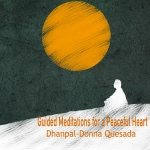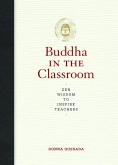When you make some special effort to achieve something, some excessive quality, some extra element is involved in it. ~Shunryo Suzuki
You know you’re surrendered to God when you rely on God to work things out instead of trying to manipulate others, force your agenda, and control the situation. You let go and let God work. You don’t have to always be in charge. Instead of trying harder, you trust more. ~Rick Warren
The quotes above emphasize the importance of letting go of the illusion of control. It’s a teaching that comes forth in all traditions, no matter how we couch it, from the Christian maxim to Let Go, Let God, to the Zen maxims that tell us to flow with whatever happens.
But, if we truly practice acceptance, won’t we become complacent, without really bothering to make improvements. And isn’t that what life is for…to improve?
Yes, we’re here to evolve, but it will never work when our eye is fixed on a certain outcome. The reason why is because a specific outcome is just a fantasy, concocted by our imaginations. And ironically, although it is created by our imaginations, which take us into the realm of the limitless, a specific outcome can be very limiting, since (1) we hardly ever get to choose the exact outcome (2) there are conceivably better outcomes than the one we imagined and (3) it is by definition conceptualized and takes us out of the present moment.
So then, how do we approach the task of healthy evolution? What is the right approach, especially when there is something seriously wrong that needs to be changed, for example, addictions, or some other self-defeating, self-degrading habit?
A conscious strategy would be to set an intention to incorporate a healthy, self-promoting habit into your daily life. In Yoga, we call it a sadhana, a daily spiritual discipline and commitment to meet ourselves, as we are, and where we are, everyday. A daily practice that brings us in touch with the present moment and what it feels like to breathe and move into our bodies, enables a connection to be made—a connection to inner stillness. It also renders conscious, what was previously unconscious.
This active process of shining the light of awareness onto what was heretofore hidden, keeps us in touch with an abiding source of strength and empowerment that can only be found within. It also keeps us in touch with the unchanging essence of who we are—because those habits that we’d like to change are not who we are. These are practices from meditation or Tai Chi, to simply walking in nature.
The irony is that, when we meet ourselves with honesty, as we are, we release the chains that have kept us from who we are to be.
When we cultivate a daily practice, and infuse it with our heartfelt intention, rather than fixate on a specific goal, we discover a much more effective and elegant strategy. When we try to change habits with iron will, by focusing only on the end result, we tend to hit a wall, since willpower can only go so far. But the rub is that our uncompromising focus on the result engenders nothing but frustration and anxiety. This is the reason dieters quickly become fixated, to the point of obsession, on food…the very thing they are trying to find a copacetic relationship with quickly becomes a monster of a problem.
Lessening our grip on the end result, and instead, redirecting our focus to our daily practice quickly becomes a source of upliftment. The intention itself, along with our conscious awareness spent in real-time, keeps us grounded in the present moment, and places us in the driver’s seat—I can only control what I do in this moment. And the result is our empowerment and increasing confidence that is generated from the inside out, rather than feigned as iron will, which leads us right back to discouragement, time and time again.
Transformation starts with wholehearted acceptance of where we are right now.
As it happens, this is a compassionate approach. Each time we sit, we accept who we are in this moment, complete and whole as we are, with all our warts and bruises. Yogic wisdom has long reminded us that transformation is a lifetime process. Several lifetimes, actually! As one of our own famously said, even though you know the staircase is there, you can only take one step at a time.
You don’t have to see the whole staircase, just take the first step. ~Martin Luther King Jr.
It’s a funny thing, we humans tend to be hard on ourselves, as if it would serve the purpose of knocking us into the right direction. The opposite is true. In the Yoga Sutras, Patanjali explains that a harsh and critical approach to transformation is a scarcely camouflaged form of ignorance.
Ignorance, in Vedic teaching (as in Buddhist teachings) is not defined as deficiency of information in the conventional sense, but rather, confusion with regard to who we really are.
In other words, when we find ourselves inflicting criticism and blame on ourselves for not being able to effectively change some behavior—not to mention the guilt we seem to to enjoy sucking on so much, like an after dinner mint—we are confusing our habit with our identity. Seeing clearly means to see the habit for what it is…just a habit.
This is where self-love comes in. Loving where you are closes the gap between here and where we’d like to be. As long as that gap exists, we’re not whole. To heal is to make whole. So, letting go of the space entails letting go of the “goal,” and embracing ourselves as perfect, right here and now.
Although modern approaches to therapy are beginning to see the wisdom of the compassionate approach, the resistance comes from the deeply ingrained belief we have as western people, that we need to “be tough,” in order to properly “kick ourselves into action.”
The reality is that this “tough guy” approach, or self-bullying often backfires into “I already screwed things up, so I might as well go all the way.” And the cycle continues.
But, by bringing ourselves to the cushion everyday, or to the Dojo, or to a healing place in nature, where we can create a sacred, meditative space, we momentarily (and that’s all we ever have, anyway, is a moment) drop our defenses and welcome ourselves in, no matter the discomfort and general unease. And low and behold, the discomfort loses its charge! It was the discomfort and defensiveness that led us into the habits in the first place, and so, they too, start to lose their power over us.
This is the power of simply being, in conscious awareness. We are in constant renewal and change, anyway, whether unconscious or conscious; why not bring consciousness to it?
In conclusion, self love in real time allows our inner trauma to be digested. Remember, the habit is, after all, a symptom, rather than an intrinsic part of who we are. So we’re getting to the cause, by healing on the inside. We’re unlocking it, listening to it, letting it move through us. We’re re-inhabiting this damaged space that we were trying to fill with the wrong things, be it cigarettes , food, shopping or alcohol, etc. We were looking for comfort in all the wrong places!
But, now, we can begin the alchemy of transformation, as we re-connect with our body, mind and spirit, with love…









